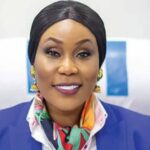U.S. says Nigeria’s monetary policies laudable, strengthen economic growth
By Mark Longyen
The United States government has lauded Nigeria’s monetary policies, being conducive for businesses to thrive, as well as strengthening and positioning the nation’s economy for overall growth.
U.S. Deputy Assistant Secretary, Bureau of African Affairs, State Department, Joy Basu, made this known at a digital news conference with participating journalists.
Basu said that the U.S. was committed to fostering its collaboration with Nigeria to tackle myriad pressing issues and obstacles, which Nigeria, being Africa’s largest economy, was facing.
The envoy said her country was working closely with the U.S. Treasury, Nigerian authorities and African central banks towards ensuring public and private sector economic restoration, stability and prosperity across Africa.
Speaking against the backdrop of the recently concluded 16th U.S.-Africa Business Summit in Dallas, Texas, Basu said the U.S. was also working on curbing Africa’s security, infrastructure and energy challenges.
“We just came back from a meeting in Abuja, which was between the Secretaries of State and the United States is committed to being a good partner of prospect.
“We have made commitments to work on the security situation, infrastructure and energy, which is a common challenge not only in Nigeria but in some other countries in the continent.
“We have made concrete commitments to work on an enabling business environment in Nigeria and to make sure that American companies that are investing in Nigeria are having a transparent experience.
“We are working closely with our U.S. treasury, and with the central banks of African countries, particularly Nigeria and the World Bank, to restore the economy, help the people and ensure public and private companies to thrive,” she said.
Reta Lewis, President, U.S. Export-Import Bank, in her remarks, highlighted U.S. efforts towards bolstering trade and investment across Africa, and emphasised the importance of transparency and accountability in fostering stronger U.S.-Africa partnerships.
She disclosed that the U.S. government had earmarked $900 billion for the construction of solar power plants in Africa, being the largest renewable energy project and transaction this year.
Lewis announced that Eximbank had approved over 1.6 billion dollars for the development of Small and Medium Enterprises (SMEs) in sub-Saharan Africa and signed MoUs with six African governments and institutions.
She added that the U.S. government signed 1.3 billion dollars MoUs with Afreximbank, Africa Finance Corporation and Nigeria’s Bank of Industry, saying such interventions aimed to stimulate competition and foster economic growth.
“We are prepared to work with African countries and stakeholders from these MoUs to partner and foster competition, 88.5 per cent of the transactions that Exim does on a yearly basis is in small businesses.
“We feel small businesses are going to be part of the work we do, not only in the U.S. but in Africa,” she said.
Lewis urged participating journalists to always highlight the positive strides being made by U.S. to support businesses and bolster economic growth in Africa against the backdrop of the continent’s prevailing challenges.
Also speaking, Alice Albright, CEO, Millennium Challenge Corporation, said that out of 17 billion dollars, which the U.S. had invested in Africa, about 10 billion dollars was allocated to infrastructure projects.(NAN)(www.nannews.ng)
Edited by Isaac Aregbesola
Published By
- Agriculture and Environment Desk Controller/Website Content Manager.
Has also recently published
 SportsJuly 15, 2025Oluwatola wins 4th AFNIS Golf tournament
SportsJuly 15, 2025Oluwatola wins 4th AFNIS Golf tournament General NewsJuly 15, 2025Okah-Donli pays tribute to Buhari
General NewsJuly 15, 2025Okah-Donli pays tribute to Buhari Economy/BusinessJuly 14, 2025Firm empowers 250 youths in hospitality
Economy/BusinessJuly 14, 2025Firm empowers 250 youths in hospitality FeaturesJuly 14, 2025Call to bar: The unstoppable journey of 5 IDPs in Edo
FeaturesJuly 14, 2025Call to bar: The unstoppable journey of 5 IDPs in Edo




